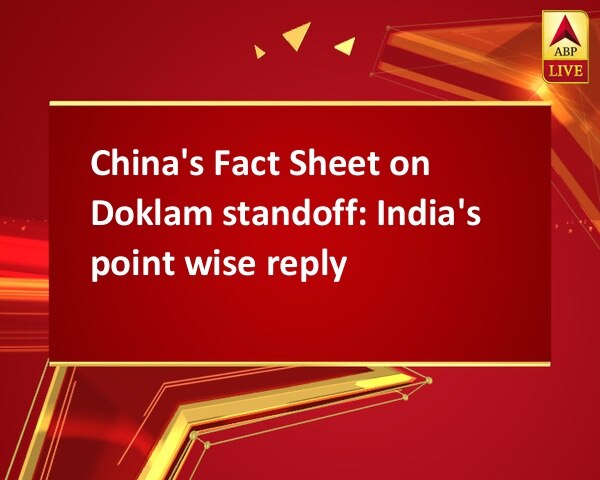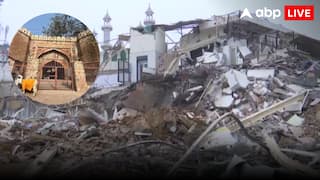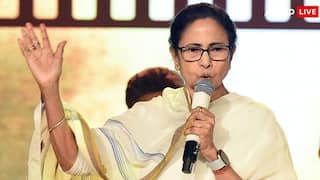China's Fact Sheet on Doklam standoff: India's point wise reply

New Delhi [India] Aug 07 (ANI): The latest 15 page 'Fact Sheet', titled "The Facts and China's Position Concerning the Indian Border Troops' Crossing of the China-India Boundary in the Sikkim Sector into the Chinese Territory", issued by China does not bring out anything new or significant, said former Ambassador Saurabh Kumar.
Kumar, who anchors the "India in the Chinese Media" project (www.niasindiainchina.in) at the National Institute of Advanced Studies, Bengaluru, told ANI, that what has been put out, has already appeared in the Chinese press since the military face-off between Indian and Chinese forces in the India- Bhutan-China tri-junction area as a result of the Chinese attempt to construct a road leading to the Bhutanese Army camp at one edge of the Doklam plateau (Zompelri).
He said that the Fact Sheet is in furtherance of the false narrative of Indian intrusion into Chinese territory that has been projected in the Chinese media in a bid to divert public attention away from the real issue, which is, China's attempt to unilaterally alter the position on the ground in the India-Bhutan-China tri-junction area, in brazen violation of accords reached with it by India and Bhutan (separately) not to change the status quo in areas of dispute pending a final agreement to the mutual satisfaction of both parties.
"There are written understandings to this effect, not to unilaterally change the status quo on the boundary on the ground, between China and India (1993 Agreement on Maintenance of Peace and Tranquillity on the Border), on the one hand, and between China and Bhutan (of 1988 and 1998, on the other, as mentioned by Bhutan in its June 29th, 2017 Press Release on the matter."
"As such, it (the Fact Sheet) does not call for any refutation or 'response', beyond the clarification regarding the origin of, and the facts relating to, the military stand-off already made by the Ministry of External Affairs on June 30, 2017", he added.
Last week, India had issued a one line statement negating the claim in this 15 page Chinese document about the reduction of Indian troops at Doklam amidst the standoff: "India considers that peace and tranquillity in the IndiaChina border areas is an important prerequisite for smooth development of our bilateral relations with China."
Ambassador Saurabh Kumar, who speaks Chinese, having begun his diplomatic career in Hong Kong and Beijing in the mid-seventies (when Chinese politics was yet in the throes of the tumultuous upheavals of the Cultural Revolution, with Mao and Zhou arbiting the charged debates from their deathbeds, as it were) under late President K. R. Narayanan, who was then the Ambassador to China, gave a point-wise reply to questions on the Chinese Fact Sheet, as follows:
(i) The claim that Doklam is, or has been, undisputed Chinese territory is completely false. The Doklam plateau is one of the many areas claimed by both Bhutan and China (and remains unoccupied and demilitarised in consequence by common consent, with only graziers and military patrols visiting the plateau periodically). The Bhutanese Government has reported these disputes to its National Assembly on a number of occasions. [This has appears to have been made to justify the PLA's attempt to effect a major shift in the status quo on the ground, cheek by jowl with two neighbouring countries, as 'normal road building activity' in its own territory, well within the sovereign right of a State.]
(ii) The claim that there was an 'international boundary' between China and India in Sikkim which Indian troops had crossed is, likewise utterly false. No 'international boundary' exists between China and India, in Sikkim or anywhere along their 3500 km. long border. [This claim appears to have been made in order to be able to hurl the charge of violation of international law and norms of conduct of interstate relations, including the UN Charter, by India in a bid to cover up China's own culpability of seeking to change the status quo on the ground in violation of recent written agreements with both India and Bhutan. And to prepare the ground for military action against India in the future, i.e. seek 'to teach it a lesson', as the Chinese are wont to do all over their neighbourhood.] The citing of the 1890 Convention between the UK and Qing China on Sikkim and Tibet by the Chinese in a bid to shore up their false narrative is disingenuous. That Convention is pertinent only in a bilateral India-China context, not in relation to the tri-junction area (which naturally involves Bhutan too, which was not a party to the Convention, as well). The India- Bhutan-China tri-junction would have to be agreed upon by India and China with Bhutan, so the Sikkim sector of the (India-China) boundary can hardly be described truthfully as "settled". There are issues there that the three countries would have to resolve together, not the least of which is the fact that some provisions of the 1890 Convention, and its follow-up, are contradictory when it comes to the tri-junction area.
(iii) The fact that the Chinese cannot deny - and are therefore silent on in all their propaganda blasts - is that the Indian action was a defensive one, triggered entirely by China's aggressive posturing in the sensitive tri-junction area overlooking the Siliguri corridor, which is land-locked Bhutan's life-line. China had to be stopped from going ahead with construction of the road on the Doklam plateau before it became a fait accompli, as a new 'fact on the ground' (as happened in the South China Sea in recent times, much to the consternation of the international community).
(iv) The intensity of the Chinese propaganda media blasts, and shrillness of tone, suggest anxiety at not being able to explain the miscalculation on the part of their military to their public. (PLA-Party relations are an extremely sensitive matter in China, with no good mechanisms to ensure observance of the desideratum-dictum 'The Party commands the gun".)
(v) A scenario in which the PLA might have thought it could get away with this 'advance' in the tri-junction area against a usually vacillating India and fearful Bhutan, on the one hand, and a Party leadership in Beijing preoccupied with an unprecedented topmost (Politburo) level purge (that took place at about the same time as when the Doklam stand-off was unfolding), on the other, cannot be ruled out. What level the decision to go ahead with construction of the road in what is perhaps the most sensitive area of the India-China border was taken is difficult to say, obviously. While a purely local level initiative is unlikely, a senior (Theatre Command) level PLA calculation, and move, to present the Party leadership in Beijing with a fait accompli on the eve of the 90th anniversary of the founding of the PLA (August 1st) is certainly not implausible.
Talking about Indian public opinion on the Doklam Standoff, Ambassador Saurabh, who served as Ambassador to Austria, IAEA & UNIDO (2007- 2009), Ireland (2003- 2007) and Vietnam (2000-2003), and also held other senior appointments in the Cabinet Secretariat and Ministry of External Affairs, said, "the Indian press has, like the Government of India, shown considerable maturity in not getting provoked unduly by the aggressive Chinese posturing. It would do well to continue to 'guard against the anger of the moment (going overboard at the Chinese miscalculation), while preserving the wrath to fight against injustice (of Chinese unreasonableness and aggressiveness)', as a Confucian insight exhorts, in case that becomes necessary on account of any Chinese adventure stemming from pique at not being allowed by India to lord it over Bhutan in this first round of test of nerves at Doklam."
"It is important that the latest Chinese Fact Sheet be seen for what it is - an element in the service of the coercive Chinese diplomacy in India's neighbourhood and strategy of pushing for advantage on the border, not a 'media information activity' common in free press societies/polities by any stretch. It is an exercise in obfuscation, not clarification, that does not merit serious consideration," said Ambassador Kumar.(ANI)
This story has not been edited. It has been published as provided by ANI




























